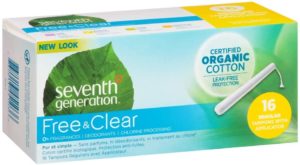Seventh Generation tampons, another eco-friendly menstrual management product, are very similar, if not exactly the same, as Natracare organic tampons. They look exactly the same out of the box, even down to the little stripe on the individual wrapping. However, their applicators are different from Natracare’s carboard applicator.

Seventh Generation Organic Cotton Tampons
Highlights: Tampons are free from fragrances, deodorants, and chlorine processing. Applicators are made with 95 percent plant-based materials and are BPA-free. Packaging is made with 100 percent recycled paper.
Seventh Generation Organic Cotton Tampons at a glance:
| Country of Origin: | Germany |
| Materials: | Certified organic cotton (absorbent material, cover, string), water repellent wax (string), cotton (sewing thread), plant-based LDPE plastic (BPA-free plastic applicator) |
| Certifications: | GOTS USDA Certified Organic Oregon Tilth (a leading organic certifier in the U.S.) |
Table of Contents
Overview
Seventh Generation applicators are made with 95 percent plant-based materials and are BPA-free, but are plastic nonetheless and therefore contribute to environmental pollution. In addition, the design of the applicator can make things a little tricky. There is a separate ‘push-stick’ inside the tube which may end up popping out of the top of the tube, meaning it has to be retrieved, making the applicator rather pointless for some folks.
Seventh Generation packaging is made with 100 percent recycled paper, and the tampons are made using certified organic cotton, and are free from fragrances, deodorants, and chlorine processing.
While Seventh Generation products are generally very good and have great eco-credentials, it’s worth noting that the company was acquired by Unilever in 2016. Unilever have a terrible environmental record. The acquisition of these smaller, eco-conscious companies could, as some argue, signal a move by Unilever to up their game when it comes to the environment, or it could be read as a cynical business-minded move to cash in on a growing market. Whether there is a positive, negative, or neutral influence from Unilever on Seventh Generation remains to be seen, with Seventh Generation claiming to maintain their independence, albeit while making profits for Unilever.
Seventh Generation tampons are available in applicator or non-applicator versions, Regular, Super, and Super Plus options and, again, it pays to buy in bulk online rather than in-store where prices are higher for single boxes:
Chlorine Free Organic Cotton Tampons – Regular with Applicator: 16-pack (16 tampons) (View on Amazon)
Chlorine Free Organic Cotton Tampons – Super with Applicator: 2 x 16-pack (32 tampons) (View on Amazon)
Chlorine Free Organic Cotton Tampons – Regular, Non-Applicator: 2 x 20-pack (40 tampons) (View on Amazon)
Chlorine Free Organic Cotton Tampons – Super Non-Applicator: 4 x 20-pack (80 tampons) (View on Amazon)
Chlorine Free Organic Cotton Tampons – Super Plus, Non-Applicator: 2 x 20-pack (40 tampons) (View on Amazon)
Seventh Generation vs. Natracare vs. Organyc
Given that Seventh Generation tampons are the same, seemingly, as Natracare’s, and Natracare remain independent and committed to sustainability and health, the more eco-friendly options remain Natracare (View on Amazon) and Organyc (View on Amazon). That said, if it’s a choice between Seventh Generation and conventional tampons made by other companies under the umbrella of Unilever, choosing Seventh Generation is better for your health, the environment (despite that plastic applicator), and might help compel Unilever to manufacture greener, healthier products overall.